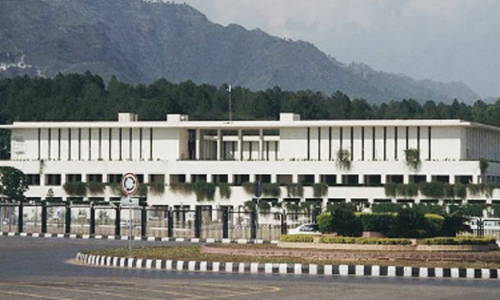ISLAMABAD: The Islamabad High Court (IHC) on Tuesday gave a nod to ‘forced’ retirement of senior bureaucrats by dismissing identical petitions that challenged the Civil Servants (Directory Retirement from Service) Rules, 2020.
The Pakistan Tehreek-i-Insaf government has introduced the Civil Servants (Directory Retirement from Service) Rules, 2020 to get rid of ‘incompetent’ officers.
The rules have enabled the retirement board/committee to prematurely retire those officers who earned average performance evaluation reports (PERs, formerly known as ACRs) or adverse remarks; twice recommended for supersession by the Central Selection Board, Departmental Selection Board or Departmental Promotion Board or twice not recommended for promotion by the high-powered selection board.
The rules created unrest among senior bureaucrats and they challenged them before the high courts and the apex court. Some of them even managed to secure restraining orders.
Justice Mohsin Akhtar Kayani of the IHC, however, dismissed all the three petitions.
Court says it is not a vested right of a civil servant to serve after completing 20 years of service
A petition was filed by BS-21 officer Ahmed Hanif Orakzai who was deferred twice for BS-22. Barrister Zafarullah Khan represented the petitioner before the IHC.
The second was a pro bono petition filed by former deputy director of the Federal Investigation Agency (FIA) Sheikh Zafar through advocate Shuaib Shaheen. Third petitioner Mohsin Shah was represented by Advocate Farook Adam Khan.
The counsel for respective petitioners contended that after accepting the offer of voluntary return under Section 25 of the National Accountability Ordinance, 1999, the respondents could not be allowed to punish the civil servants by enforcing directory retirement from service, adding that the rules are contradictory in nature and inconsistent with the acts of parliament, precedents and provisions of the NAO, 1999, as well as of the Government Servant (Efficiency & Discipline) Rules, 1973; per se, Section 13 of the impugned Rules gives unbridled discretionary powers to the competent authority to pass direction in respect of retirement of a civil servant.
Assistant Advocate General Barrister Mumtaz, along with representatives of the Establishment Division, contended that Orakzai’s petition was based on a mere apprehension that in case the high-powered selection board did not find the petitioner fit for promotion to BS-22, he would face directory retirement.
According to Orakzai’s counsel, Section 13 of the Civil Servants Act, 1973, has defined the criteria for removal of delinquent officers and the government unnecessarily invoked the directory rules.
The Civil Servants Act, 1973 was notified on Sept 29, 1973, with the purpose of regulating the appointment of persons to and the terms and conditions of service of persons in the service of Pakistan.
The court noted that Section 13 of the Civil Servants Act, 1973, has a checkered history where Section 13(1) was initially enacted without any prescribed rule to deal with the situation that a civil servant shall retire from service after completion of 20 years of service qualifying for pension and other retirement benefits, as such, the Establishment Division issued guidelines for review of cases of civil servants by Review Committee on certain parameters, whereby a civil servant is recommended for retirement in cases where two or more penalties have been imposed upon him under the Government Servant (Efficiency & Discipline) Rules, 1973.
The court observed: “It is not a vested right of a civil servant to serve after completion of his 20 years of service till age of superannuation, rather it depends upon the will of the competent authority or pleasure of the government as highlighted in Section 4 of the Civil Servants Act, 1973, such discretion has to be regulated through a criteria mentioned in Rule 5 of the Civil Servants (Directory Retirement from Service) Rules, 2020.”
Published in Dawn, EOS, June 16th, 2021













































